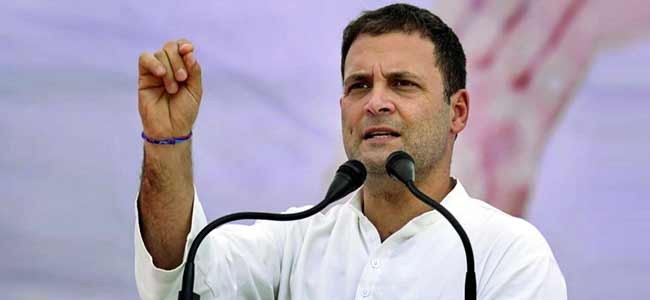
With just months to go for the Lok Sabha election, Congress president Rahul Gandhi on Monday said his party will guarantee minimum income for every poor if his party comes to power in the 2019 polls.
"We have now taken a step that no government has taken before. We have decided to give every poor person a Minimum Income Guarantee when we form the government. This is a historic step taken to eradicate hunger and poverty,” said Rahul Gandhi while addressing a farmers’ rally in Chhattisgarh’s Raipur.
Former Finance Minister P Chidambaram too said that the “poor of India have the first charge on the resources of the country” and that the “Congress will find the resources to implement the promise of Rahul Gandhi”.
Chidambaram pointed out that “140 million people were lifted out of poverty between 2004 and 2014”, the period when the UPA was in power at the Centre.
Chidambaram also stressed the point that Universal Basic Income has been discussed widely in the last two years and that the “time has come to adapt the principle to our situation and our needs and implement the same for the poor”.
The plan will further be explained in the Congress manifesto, Chidambaram said.
The concept was first introduced by former chief economic adviser, Arvind Subramanian in the economic survey of 2017 by the name of universal basic income. However, the plan never saw the light of the day.
“Nobody in the country will remain poor now. The Congress party will ensure that minimum income will be credited to bank accounts of everybody,” said Gandhi.
Gandhi also hinted that the current Congress ruled states of Rajasthan and Madhya Pradesh may see such a scheme in the near future. He said, “We will implement this in Madhya Pradesh, Rajasthan and subsequently in the entire nation.”
We had earlier reported that the Bharatiya Janata Party (BJP) government was likely to roll out the scheme during the February 1 interim budget.
Stung by the defeats in three crucial states in the Hindi heartland and facing anger over an ongoing agricultural distress, the BJP was likely to announce the roll-out of the scheme.
Officials had said that a pro-poor budget that appeals to the rural poor and deals with the agrarian crisis is likely.
“The government is seriously considering the announcement of the Universal Basic Income to help pull people out of poverty," said one official.
In its manifesto in Rajasthan, the BJP had pledged a universal basic income that will be arrived at “after taking into consideration (the beneficiary’s) income from various sources and the government benefits (she receives)”.
The idea has been in discussion in the west for years and has been tried in Canada and Switzerland as part of a pilot project.
In an interview, Subramanian had said that he had discussed the idea with the Jammu and Kashmir government where it was still "embryonic" and Bihar chief minister Nitish Kumar who was "very encouraging and excited about it".
He added that "there are ways of taking it forward and I think that the Centre can give states the freedom to spend the money on things that they want to… maybe some states will take up UBI."
But there are those who feel that the country might not be ready for it. For instance, a common argument against UBI is that it would disincentivise work.
Subramanian, while arguing for careful implementation, said, "I am not clear if there is evidence for that argument. There is a little bit of paternalism in that argument. I mean if you're really poor which is what this addresses, are we sure that getting people from having very little to up to the poverty line is going to make them stop working?"
Sikkim is likely to be the first state in India to roll out the Universal Basic Income or UBI, with the ruling party Sikkim Democratic Front (SDF) including it in its manifesto ahead of the state’s Assembly election this year.
Minimum income guarantee seeks to alleviate poverty by providing a basic income to all citizens of a particular state or geographical area, irrespective of their income, social standing, or employment status. The idea behind a basic income is that all are entitled to a reasonable income, notwithstanding their contribution to the economy.
The BIEN (Basic Income Earth Network) — a network of academicians advocating for the scheme to all — describes basic income as a “periodic cash payment unconditionally delivered to all on an individual basis, without means-test or work requirement.”
A 40-page chapter, called Universal Basic Income: A Conversation With and Within the Mahatma, included in the economic survey of 2017 outlined the UBI in three components — universality, unconditionality, and agency (by providing support in the form of cash transfers to respect, not dictate, recipients’ choices).


.jpeg)

